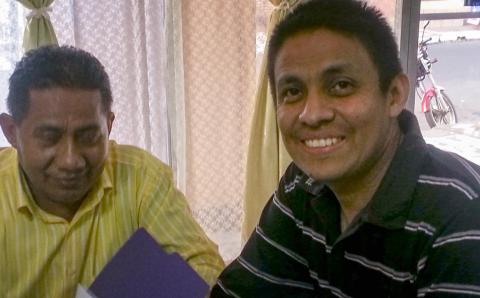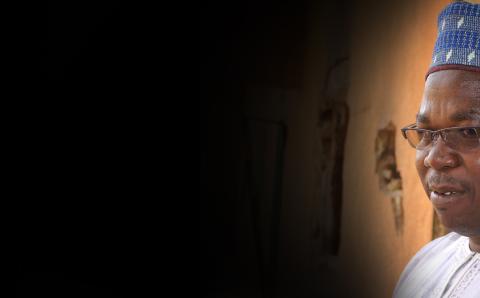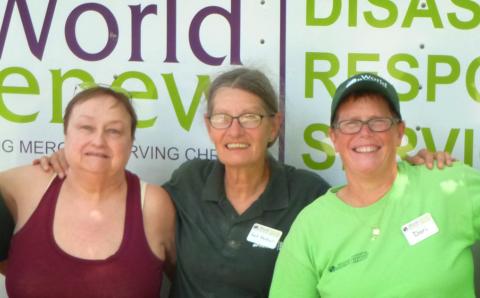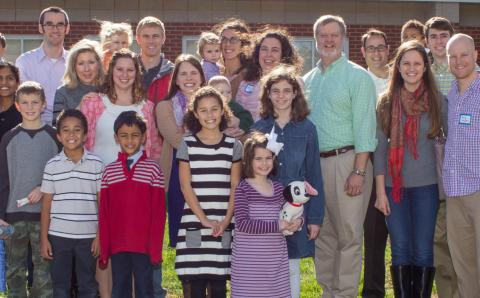As we take the off-ramp of US-290 West, I am shocked to see groups of homeless individuals huddled in the darkness beneath the overpasses. A short block later, on the right, more groups of men and women are gathered on a patio around some picnic tables. A sign on the lawn reads, “Hot diggity. You’ve made it to the Weirdest Little Church in Texas.”
That church is Sunrise Community Christian Reformed Church in Austin. Here, those from under the overpasses and those on the patio who are poor, hungry, addicted, or mentally ill, will find welcome, food, hot coffee, clothing, medical assistance, and even an address they can use for receiving mail. They will find restrooms and showers. I’d traveled to Sunrise to meet the people who work here, to speak with some of those touched by its many ministries. And maybe I’d discover why they call themselves weird.
On any given Sunday morning at Sunrise, they say, you could be sitting next to a person who is chronically homeless, a PhD student, someone reeking of alcohol, or someone with a six-figure income. Although we tried to look inconspicuous, my husband and I are noticed immediately as visitors and warmly greeted by a number of people. Had we lingered in the foyer before the service, we would have seen many people going in and out, using the restrooms and helping themselves to the contents of the fridge.
A young woman gives her testimony during the service. A former meth addict, she confesses her frailties and failures, including how she had to surrender her two children to the care of her mother and how at one point, she lived out of her car. She’s maintained sobriety for the past 11 months, she says. She confesses her faith in Jesus and hopes the congregation will accept her as a member of the church. Only then do I realize that I’m witnessing a profession of faith. When pastor Mark Hilbelink asks the congregation if they will promise to love, encourage, and support her, there is no solemn “We do, God helping us.” Instead, their response is a spontaneous standing ovation accompanied by much enthusiastic clapping and shouting.
Over lunch with eight people from the congregation, I asked what they would like others to know about Sunrise.
“It’s okay to come here even before you believe.”
“I feel welcome and not looked down upon because I am different.”
“I had wounds that were healed through this church.”
“I feel safe in this church.”
On Monday morning, Emily Grace Clark, the church’s case manager, sits at her computer with Forest, helping him fill an online application for work. “Forest is such a success story,” she said later. “When he first came to the church he was drunk and homeless. Now he is sober, has a home, and works.”
Forest describes his new home, a small camper with a sink, a toilet, a fridge, and a bed. All he needs, he says. It’s situated on the property of Sunny and Sher, a lesbian couple from the church who invited him to stay after he did some temporary work for them.
Clark warmly greets every person who comes through the door. “Have you slept?” “How are you feeling?” Of one man, she asks, “Are you staying clean?” “I have to,” he replies, “or I’ll go back to prison.” Clark said, “We give dignity back to people when we inquire about how they’re doing and also when they have someone to complain to.”
Her job includes helping people find a place to live, helping them find a birth certificate or a child they may not have seen in a decade. She obtains food stamps and distributes bus passes, 1,314 of which were awarded to Sunrise as part of a grant. One person comes daily to get his blood pressure medication, which she keeps locked in her desk. She shows the drawer where mail is kept for the 200 homeless individuals for whom the church is their mailing address. Another drawer holds many of their important documents for safekeeping.
In the lobby, a volunteer is sorting piles of donated clothing. A man named Frank arrives with a load of donated donuts, cakes, and other pastries. Frank is a gleaner, visiting stores and bakeries throughout the city and delivering day-old baked goods to a half dozen nonprofits and churches like Sunrise. Soon after, 300 breakfast tacos are delivered from a local restaurant, as they are every Monday, and placed outside beside a microwave and the fridge. Fifteen pots of coffee are brewed each morning.
Every weekday, the Sunrise Neighbourhood Youth Program offers after-school care to around 100 children from low-income homes who are picked up from eight different schools and brought to the church. They receive help with homework and a meal. The church also runs summer camps.
Not everyone in this south Austin neighborhood, however, is happy about the church’s ministry to people who are homeless, and many believe the problem is getting worse. Currently, tensions are high. “They think our free sandwiches are bringing more people around here indefinitely,” Hilbelink says. “In fact, we’ve helped more than 25 individuals get off the street and into permanent housing in the last 12 months.” Sunrise has even rented a house in the neighborhood where five formerly homeless individuals live together.
In spite of neighborhood discontent, Sunrise is growing very quickly. “I think the reason,” offers Hilbelink, “is that people have subconscious appetite for being a part of a community on radical mission. We’re a weirdly attractional church, not for the regular reasons such as programs, great bands, good-looking pastor, or nice building, but for reasons that transcend time. The church is at its best when it is radically meeting the greatest needs of the community and building a diverse community of people we’re generally too scared to hang out with.”
At Sunrise, being a member of a small group is essential. In the intimate community of a small group, members confess, pray, study, eat, serve together, take care of each other, and hold each other accountable. Hilbelink believes that people who are connected to a small group grow faster than those who don’t.
I attended a small group taking place at Hilbelink’s home where they are studying the book Pastrix by Nadia Bolz-Weber. As we prepare to end the meeting, Hilbelink reads a passage that was particularly meaningful for him: “Death and resurrection, the recurring experience of seeing the emptiness, weeping over our inability to fill it or even understand it, and then listening to the sound of God speaking our names and telling God’s story is a messy business. But it’s my business, and it’s the most beautiful thing I could tell you about.”
“This is my life at Sunrise,” Hilbelink concluded. Nothing weird about it at all, I think as I leave.
About the Author
A former nurse and chaplain, Janet Greidanus is a freelance news correspondent and long-time writer of the In Memoriam column for The Banner.









